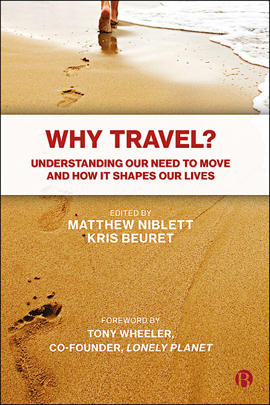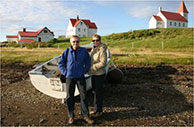Why Travel? – Understanding our Need to Move & How it Shapes our Lives
Friday, 9 July 2021 Despite the pandemic’s restrictions on my travels – I’ve made a few trips around Australia, but I haven’t been overseas for over a year – I have been busy travelling on paper (and digitally) at least. Most recently that’s been by writing a foreword for Why Travel? – Understanding our Need to Move & How it Shapes our Lives, an academic study edited by Matthew Niblett and Kris Beuret for Bristol University Press in the UK. It’s just been published and explores the fundamental motivations why people travel in a series of essays bringing together expert insights on travel behaviour from a wide range of fields, from evolutionary biology to sociology and philosophy.
Despite the pandemic’s restrictions on my travels – I’ve made a few trips around Australia, but I haven’t been overseas for over a year – I have been busy travelling on paper (and digitally) at least. Most recently that’s been by writing a foreword for Why Travel? – Understanding our Need to Move & How it Shapes our Lives, an academic study edited by Matthew Niblett and Kris Beuret for Bristol University Press in the UK. It’s just been published and explores the fundamental motivations why people travel in a series of essays bringing together expert insights on travel behaviour from a wide range of fields, from evolutionary biology to sociology and philosophy.
I’ve been involved in assorted other projects during the pandemic, some of which I wrote about in a blog a few months ago. That mentioned En Defensa del Viaje, a book (in Spanish!) about how post pandemic travel might turn out. It’s already looking a little out of date! I also contributed to 100% Pure Future, a book about how the post-pandemic travel world might shape up in New Zealand – since kiwiland had been worrying about overtourism pre-pandemic. Other books I mention in that blog include a Singapore and TEDx book, Hilary Bradt’s new Socotra guide and Gerdette Rooney’s entertaining Womadic Wanders.
More recently there’s been a beautiful photographic book on Kolkata (Calcutta) – The Goddess & the City: Kali & Kolkata – for which I wrote the foreword. Not to mention a cover paragraph – that’s all I contributed! – to the amazing shipwreck story of The Tsarinas Lost Treasure.
There are a couple more books I can claim some link to still in the works, but meanwhile here’s my foreword to Why Travel:
Travel? Oh I remember that. I visited 14 countries in 2019, if we count Transnistria as a country, and 20 the year before. Even in 2020, before it all went wrong, I’d been to five countries – at home in Australia, in Japan (for a university conference on ‘Overtourism,’ remember overtourism?), then the UK, Egypt and Yemen before I had to rush home as the gates slammed shut. And slam shut they most definitely did. Indeed, in this very book Chapter 4 on Philosophy notes that the USSR didn’t like Article 13 of the UN Declaration of Human Rights, which insists that entering and leaving your own country is a basic human right, but today it’s Australia which has totally tossed out that right. You’re trapped in Australia, unless you’re a movie or sports star or billionaire friend of the government of course.
So every chapter of Why Travel underlines just how important travel has been and will continue – one day – to be in my life. Since writing Lonely Planet’s first guidebook – almost 50 years ago – travel has been my work and my life, but just as football is much more important than mere life and death, so travel has been much more for me. Fortunately, like many of us suffering an enforced travel-free diet it’s been surprising how much travel I still enjoyed, certainly I’ve rediscovered and extended the boundaries of my own back yard. The pandemic has emphasized how much nature and how many birds pop up right outside my kitchen window, I’ve rediscovered so many travel memories, partly through finally got around to sorting out my much too extensive pre-digital (ie colour slide) photo collection.
Perhaps most importantly I’ve had plenty of time to ponder just why travel is so important. Certainly the pandemic has been an enforced opportunity to look at the problems travel brings – from overtourism to environmental and climate damage – and examine how we can do things differently post-pandemic. But there has also been plenty of opportunity to think about the good stuff that travel does and worry about people, far from our sheltered first world, who have been doing it really hard over the past year. ‘Come back, we miss you,’ has been a message from an awful lot of tourist destinations and most emphatically from those developing world locations where tourist income was a huge part of the local economy.
Why Travel points out comprehensively that travel is such a fundamental – even hard-wired – part of human existence that it’s inevitable that it will come back. Economic shocks, terrorist attacks, natural disasters and previous pandemics have all taken their toll, but on every occasion travel has bounced back. Even Spanish Flu and the Black Death were just temporary potholes. Inevitably there will be differences, some of them big ones, between travel pre and post-pandemic. It’s easy to contemplate possible changes – big ticket travel bounces back, people who can afford chartered boats and private jets are going to feel insulated and safe and they can afford it, but what about the budget travellers, the backpackers? I’ve always felt that the gap year trip, that first big experience of independent travel, was almost an essential part of growing up, a more valuable spell of education than years of school. Why travel? Well that’s a very good reason why.






